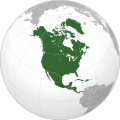
A farmer is a person engaged in agriculture, raising living organisms for food or raw materials. The term usually applies to people who do some combination of raising field crops, orchards, vineyards, poultry, or other livestock. A farmer might own the farmland or might work as a laborer on land owned by others. In most developed economies, a "farmer" is usually a farm owner (landowner), while employees of the farm are known as farm workers. However, in other older definitions a farmer was a person who promotes or improves the growth of plants, land, or crops or raises animals by labor and attention.
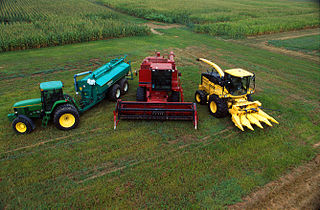
An agricultural subsidy is a government incentive paid to agribusinesses, agricultural organizations and farms to supplement their income, manage the supply of agricultural commodities, and influence the cost and supply of such commodities.
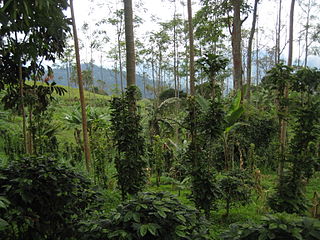
Sustainable agriculture is farming in sustainable ways meeting society's present food and textile needs, without compromising the ability for current or future generations to meet their needs. It can be based on an understanding of ecosystem services. There are many methods to increase the sustainability of agriculture. When developing agriculture within sustainable food systems, it is important to develop flexible business processes and farming practices. Agriculture has an enormous environmental footprint, playing a significant role in causing climate change, water scarcity, water pollution, land degradation, deforestation and other processes; it is simultaneously causing environmental changes and being impacted by these changes. Sustainable agriculture consists of environment friendly methods of farming that allow the production of crops or livestock without causing damage to human or natural systems. It involves preventing adverse effects on soil, water, biodiversity, and surrounding or downstream resources, as well as to those working or living on the farm or in neighboring areas. Elements of sustainable agriculture can include permaculture, agroforestry, mixed farming, multiple cropping, and crop rotation.
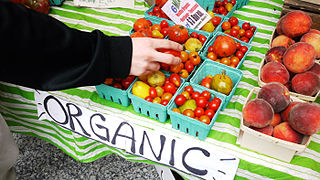
The organic movement broadly refers to the organizations and individuals involved worldwide in the promotion of organic food and other organic products. It started during the first half of the 20th century, when modern large-scale agricultural practices began to appear.

La Vía Campesina is an international farmers organization founded in 1993 in Mons, Belgium, formed by 182 organisations in 81 countries, and describing itself as "an international movement which coordinates peasant organizations of small and middle-scale producers, agricultural workers, rural women, and indigenous communities from Asia, Africa, America, and Europe".
Jean Léopold Dominique was a Haitian journalist and activist for human rights and democracy in Haiti. His station, Radio Haiti-Inter, was the first to broadcast news, investigative reporting, and political analysis in Haitian Creole, the language spoken by most Haitian people. On 3 April 2000 he was assassinated as he arrived for work at Radio Haiti-Inter. An extensive though turbulent investigation failed to officially identify and bring to justice the primary perpetrators, who remain at large.
Agribusiness is the industry, enterprises, and the field of study of value chains in agriculture and in the bio-economy, in which case it is also called bio-business or bio-enterprise. The primary goal of agribusiness is to maximize profit while satisfying the needs of consumers for products related to natural resources such as biotechnology, farms, food, forestry, fisheries, fuel, and fiber.

A smallholding or smallholder is a small farm operating under a small-scale agriculture model. Definitions vary widely for what constitutes a smallholder or small-scale farm, including factors such as size, food production technique or technology, involvement of family in labor and economic impact. There are an estimated 500 million smallholder farms in developing countries of the world alone, supporting almost two billion people. Smallholdings are usually farms supporting a single family with a mixture of cash crops and subsistence farming. As a country becomes more affluent, smallholdings may not be self-sufficient. Still, they may be valued for providing supplemental sustenance, recreation, and general rural lifestyle appreciation. As the sustainable food and local food movements grow in affluent countries, some of these smallholdings are gaining increased economic viability in the developed world as well.
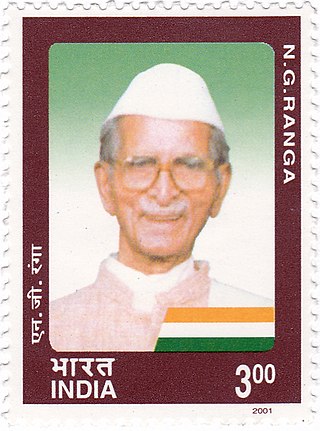
AcharyaGogineni Ranga Nayukulu, also known as N. G. Ranga, was an Indian freedom fighter, classical liberal, parliamentarian and farmers' leader. He was the founding president of the Swatantra Party, and an exponent of the peasant philosophy. He received the Padma Vibhushan award for his contributions to the Peasant Movement. N.G. Ranga served in the Indian Parliament for six decades, from 1930 to 1991.
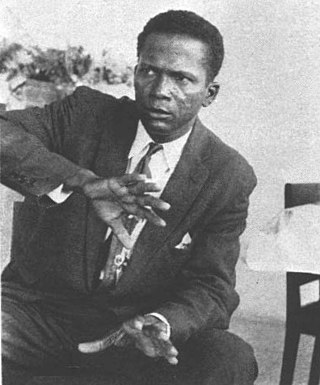
Pierre-Eustache Daniel Fignolé was a Haitian politician who became Haiti's provisional head of state for three weeks in 1957. He was one of the most influential leaders in the pre-Duvalier era, a liberal labor organizer in Port-au-Prince so popular among urban workers that he could call upon them at a moment's notice to hold mass protests, known as "woulo konpresè"—Haitian Creole for "steamroller."
Thomonde is a commune in the Hinche Arrondissement, in the Centre department of Haiti. It is located in the Centre or "Plateau Central", arrondissement Hinche. Its sections are Cabral, Tierra Muscady, Baille Tourrible, and La Hoye. The geo-coordinates are 19.02N and 71.97W.
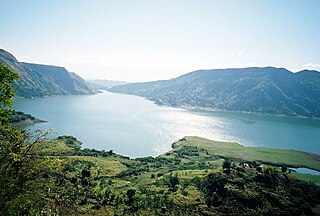
The Péligre Dam is a gravity dam located off the Centre department on the Artibonite River of Haiti. At 72 m (236 ft) it is the tallest dam in Haiti. The dam was created as a flood-control and an energy-providing measure in the Artibonite River Valley during the 1950s, as part of the Artibonite Valley Agricultural Project. This dam impounds Lake Péligre.

Social class in Haiti is defined by a class structure that groups people according to wealth, income, education, type of occupation, and membership in a specific subculture or social network. Race has also played an important factor in determining social class since the colonial period (1625–1804) when Haiti was the French colony of Saint-Domingue.
Jean-Baptiste Chavannes is an agronomist from Haiti.

Agroecology is an applied science that involves the adaptation of ecological concepts to the structure, performance, and management of sustainable agroecosystems. In Latin America, agroecological practices have a long history and vary between regions but share three main approaches or levels: plot scale, farm scale, and food system scale. Agroecology in Latin American countries can be used as a tool for providing both ecological, economic, and social benefits to the communities that practice it, as well as maintaining high biodiversity and providing refuges for flora and fauna in these countries. Due to its broad scope and versatility, it is often referred to as "a science, a movement, a practice."

Agricultural machinery relates to the mechanical structures and devices used in farming or other agriculture. There are many types of such equipment, from hand tools and power tools to tractors and the farm implements that they tow or operate. Machinery is used in both organic and nonorganic farming. Especially since the advent of mechanised agriculture, agricultural machinery is an indispensable part of how the world is fed.
A sustainability organization is (1) an organized group of people that aims to advance sustainability and/or (2) those actions of organizing something sustainably. Unlike many business organizations, sustainability organizations are not limited to implementing sustainability strategies which provide them with economic and cultural benefits attained through environmental responsibility. For sustainability organizations, sustainability can also be an end in itself without further justifications.

GMO OMG is a 2013 American pseudoscientific documentary film which takes a negative view towards the use of genetically modified organisms used in the production of food, in the United States. The film focuses on Monsanto, a multinational agrochemical and agricultural biotechnology corporation, and their role in the food industry alongside the effects of GMOs and how they are generated.

Endorsed in December 2017, the United Nations Decade of Family Farming 2019-2028 seeks to place family farming at the center of national public policies and investments. In declaring this decade, the United Nations General Assembly recognized the importance of family farming in reducing poverty and improving global food security. The UN Decade of Family Farming is led by the Food and Agriculture Organization (FAO) and the International Fund for Agricultural Development (IFAD) in collaboration with governments and civil society organizations.
A number of movements seek to expand the practice of agroecology in West Africa. Agroecology is a scientific discipline, movement and practice that integrates ecology in agriculture with strong emphasis on diversification, food sovereignty, energy efficiency and sustainability. Agroecological practices apply the systems and knowledge that traditional farmers in the region have developed and inherited. The agroecological social movement empowers smallholder farmers that hold the knowledge of indigenous farming systems, however are recently engulfed by larger farms or are migrating to urban areas, looking for better paying jobs.














